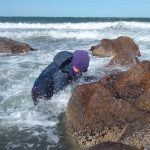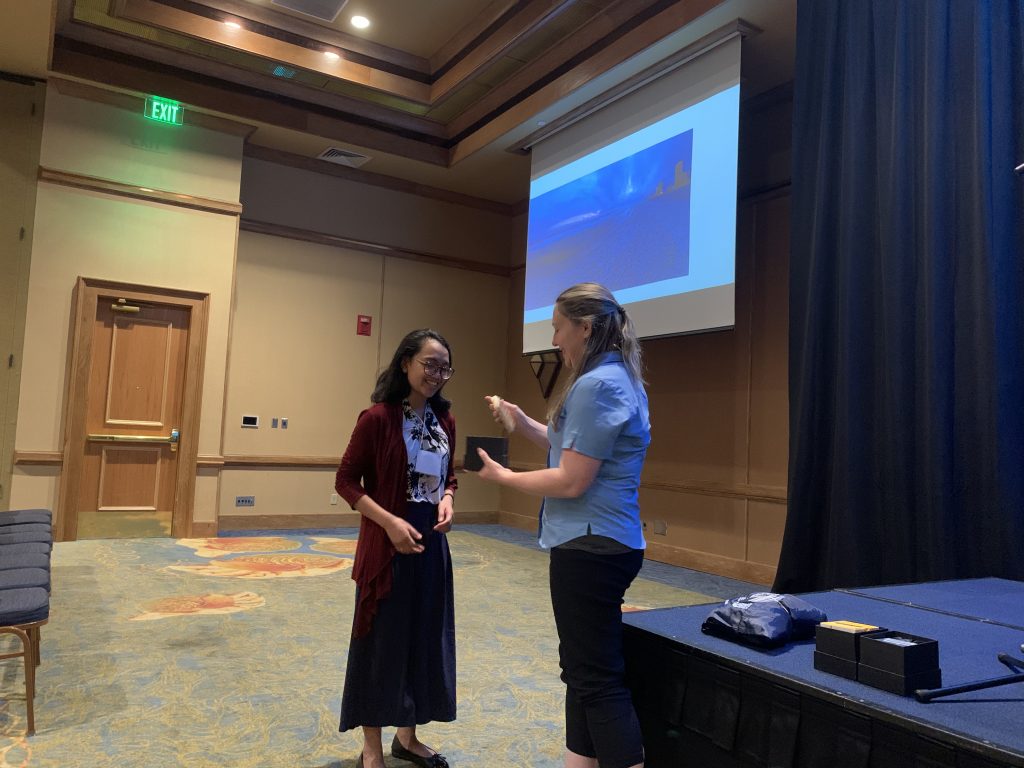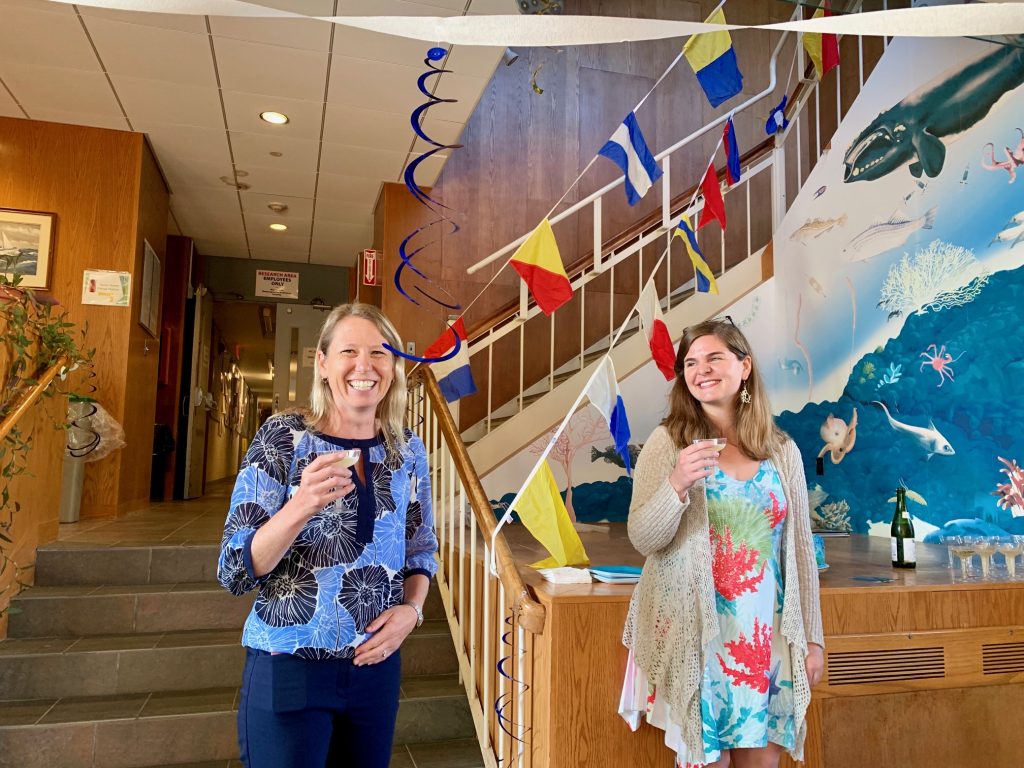Welcome!
This blog provides an opportunity for the WHOI community to get to know our students a little better, a forum to share information with the students, and a window into the JPBO for the outside world. The primary focus is on the MIT-WHOI Joint Program in Biological Oceanography. Please send suggestions for blog content to atarrant (at) whoi (dot) edu.
At least one good thing has come from a recent virtual meeting:
Christina (Chrissy) Hernández was awarded the 2020 Alfred J. Lotka prize of the Theoretical Ecology Section of the Ecological Society of America. The prize is given to the best poster presented by a student at the annual ESA meeting. Chrissy’s poster was entitled “Maternal effect senescence and fitness: demographic analysis of a novel model organism”. The work has recently been published:
Hernández, C.M., van Daalen, S.F., Caswell, H., Neubert, M.G. and Gribble, K.E., 2020. A demographic and evolutionary analysis of maternal effect senescence. Proceedings of the National Academy of Sciences, 117(28), pp.16431-16437.
Congratulations to Chrissy and her co-authors!
The paper:
Fowler, BL, M.G. Neubert, K. R. Hunter-Cevera, R. J. Olson, A. Shalapyonok, Andrew R. Solow, H. M. Sosik (2020), Dynamics and functional diversity of the smallest phytoplankton on the Northeast U.S. Shelf, Proceedings of the National Academy of Sciences, 201918439; DOI: 10.1073/pnas.1918439117
was selected as the best paper by a graduate student or recent graduate alum in Biological Oceanography. At the 2020 Joint Program Commencement Ceremony, Bethany Fowler was given the Ruth and Paul Fye Award for Excellence in Oceanographic Research (Graduate Student Best Paper Award). Bethany’s paper was chosen for this award from among a number of exceptional papers authored by JPBO students. Criteria for selection included the creativity, novelty and significance of the work. Congratulations Bethany!
Deepa Rao conducted her Ph.D. research within the MIT-WHOI Joint Program in Biological Oceanography, advised by Dr. Mick  Follows. She is a Spring 2020 graduate. Due to the Covid-19 pandemic, our students and faculty have all had to be resilient and resourceful. The last stages of Ph.D. research through the final defense are often stressful in the best of times. Wondering what it would be like to defend a dissertation virtually during a pandemic? Deepa shared her story with me.
Follows. She is a Spring 2020 graduate. Due to the Covid-19 pandemic, our students and faculty have all had to be resilient and resourceful. The last stages of Ph.D. research through the final defense are often stressful in the best of times. Wondering what it would be like to defend a dissertation virtually during a pandemic? Deepa shared her story with me.
Second-year student Jane Weinstock has been awarded a Ruth D. Turner Scholarship in Marine Biology. The $6500 award will provide support for Jane’s proposed research on “Ocean warming in the Western North Atlantic: Potential phenological changes in the barnacle Semibalanus balanoides.” She has provided a couple pictures of her sampling in the field (from a particularly windy, chop py day this winter). The smile on her face (featured image, viewable from main blog page) proves her dedication and enthusiasm for the work!
py day this winter). The smile on her face (featured image, viewable from main blog page) proves her dedication and enthusiasm for the work!
Dr. Ruth D. Turner was a world-renowned marine biologist with a love of natural history and expertise on marine molluscs and deep-sea biology. The Turner Scholarships support PhD students conducting research in marine biology and ecology and enrolled in New England Colleges and Universities. Reflecting her interests, the proposed research must involve marine invertebrates with priority given to applications involving molluscs.
The Spring 2020 semester was certainly an adventure. Our students and faculty displayed considerable resilience, patience, ingenuity and good-humor in navigating the transition to online teaching. It was a steep learning curve, but you all did a fantastic job of climbing it. I’ve attached a set of tips for online teaching based on “de-briefing” discussions with student and faculty. We don’t know yet what the Fall semester will hold, but we will all do our best to make it a productive learning environment!
Zachary (Zac) Tobias has recently been awarded a National Defense Science and Engineering Graduate Fellowship. Zac proposal was titled “”Evolutionary dynamics of a widespread invasive fouling species.” Through his research, he will explore the genomic and physiological consequences of admixture/interbreeding between multiple introductions of a non-native tunicate (Botryllus schlosseri). He seeks to understand how these processes they may underlie evolutionary adaptation to cold temperatures during the northward spread of this tunicate.
Congratulations Zac!
Dr. Petra Klepac received a Ph.D. from the MIT-WHOI Joint Program in Biological Oceanography in 2007. Advised by Dr. Mike Neubert, Petra studied the mathematical epidemiology of phocine distemper virus in harbor seals. She’s currently an assistant professor of infectious disease modeling at the London School of Hygiene and Tropical Medicine. She describes her current research program as lying at “the interface of epidemiology, economics, ecology and mathematics” and states that she uses a highly interdisciplinary approach to model optimal strategies for control of infectious diseases.
Petra’s research program highlights of how JPBO graduates not only make fundamental contributions to understanding biology in the ocean, but also apply their skills to diverse problems confronting society. An opinion piece written by Petra was posted by the Guardian in March 2020: What we scientists have discovered about how each age group spreads Covid-19
Alia Hidayat won the Best Student Speed Talk award at the 2019 US Harmful Algal Blooms Symposium in Orange Beach, Alabama. Alia’s talk was entitled “Domoic acid exposure induced transcriptional changes in the brain — potential effects on microglia.” Alia is a third-year student advised by Neel Aluru.
In August, Alia gave an excellent short talk in the WHOI Biology Department seminar series. It is exciting to now see her work recognized externally as well.
Do you enjoy hearing about student research? Several of our second year students will be giving short talks on February 27 and March 5.
(Note: this post was largely written by Bethany Fowler, as described below)
Many WHOI students and postdocs are interested in obtaining training and experience in teaching. One possible avenue is through the Kaufman Teaching Certificate program. JP student Bethany Fowler recently completed this program and has generously agreed to share her experiences:
Why did I do it?
I applied to the Kaufman Teaching Certificate program because I think good teaching is both incredibly valuable and rare. I wanted to learn more about how I could become a better teacher and also gain a sense for whether I would enjoy teaching if it were a major component of my career. I gave these reasons when Mike [co-advisor Mike Neubert] asked why I wanted to take the course, and he was happy that “to make me more employable” wasn’t among them. The Kaufman Teaching Certificate program forced me to think critically about what it means to learn and how an instructor can help all different people do so. I did also get a certificate, which may or may not be useful later on.
What did we do?
The program covered a variety of topics–from how to structure an individual lesson, to how to create a supportive atmosphere for students. We read literature about motivation, information retention, stereotype threat, and most controversially, the pitfalls of lecturing. I’ve been lucky enough to have some professors who incorporate learning research into their teaching methods, but in case anyone hasn’t, the Kaufman course itself can serve as an example. In class, we completed activities, discussed readings, and provided feedback to peers. In this case, the exercises were doubly valuable: they helped us learn the material and gave us ideas to use in our own classrooms.
Would I recommend it? To whom?
The course is open to students and post-docs across all MIT departments, and in my class at least, there was a diversity of teaching experience among the participants. I think everyone benefited from the discussions and reflection, but it is hard to know how much any individual’s teaching will improve. I don’t think the course is meant to immediately make anyone a great teacher, but it gave me the tools I’ll need to keep moving in the right direction.
One concrete outcome is that I’ve now written a statement of my Teaching Philosophy and received feedback on it from multiple people. For this reason, I’d especially recommend the course to graduate students and post-docs who find that task daunting. After the program, it was really easy to pick out ideas about teaching that I genuinely value and want to emphasize in my career.
Congratulations to Dr. Laura Weber, who successfully defended her Ph.D. thesis, “Characterizing the ecology of coral reef microorganisms across different scales within the Caribbean” on September 11. Laura was advised by Amy Apprill.
In her public defense, Laura showed results characterizing the microbial community composition in seawater surrounding reef-building corals. She compared microbial communities across reefs ranging from the Florida Keys to Cuba, and on small spatial scales (within a meter) near coral colonies. A particularly interesting set of results related to daily (night vs. day) cycles in microbial composition, as well as broader shifts in community composition over a three-day period. Laura’s presentation also featured spectacular illustrations that represented and helped to integrate the different components of her work.
We look forward to seeing the continued impact of this work and all of Laura’s future endeavors!
- « Previous
- 1
- 2
- 3
- Next »




